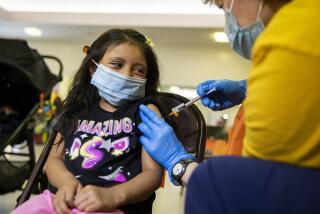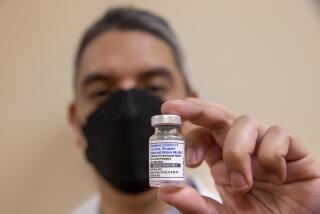County Plans Vaccination Database : Health: Officials hope to have a computer track childhood immunizations by next year, but much rests on a piece of state legislation.
- Share via
To protect infants and toddlers from potentially deadly diseases, Ventura County health officials are assembling a computerized tracking program to keep tabs on immunization shots for all preschool children in the county.
The new computer registry will tentatively start next year by tracking vaccinations given to children at county health centers in Ventura, Oxnard and Simi Valley.
If all goes as planned, health officials will then expand the program to all children, logging their birth records into the computer system and then automatically sending their parents reminder notices of needed shots.
Health officials believe the computerized registry can boost local immunization levels to about 90% and thus guard against lethal outbreaks of measles, hepatitis or whooping cough that have surfaced in other parts of the nation. About 61% of children in the county are fully immunized at age 2.
“We have been fortunate that we have not had an epidemic sweep through the county,” said Dr. Gary M. Feldman, the county’s health officer. “But we are getting to dangerously low levels of immunization and we will get hit if we don’t do something about it.”
The county’s plans, however, rely largely on Gov. Pete Wilson signing a bill on his desk that would exempt childhood immunization records from privacy protections covering medical records.
As of Wednesday, Wilson had not signed the bill passed last month by the state Legislature. Although the measure has wide support from public health officials, Assemblyman David Knowles (R-Cameron Park) is urging Wilson to veto the bill, saying it would merely lead to more government intrusion into private lives.
“It is just another Big Brother databank that we don’t need,” said Lance Hastings, an aide to Knowles.
Feldman said he is confident that the law will change by 1997, when the county is ready to make its computerized registry available to every pediatrician and health care clinic in the county.
For now, the county Health Care Agency is focused on buying a computer and developing the software that could ultimately link the county’s immunization registry to similar programs in a half-dozen other counties or possibly a statewide immunization databank.
State health officials have promised $247,000 a year to run the county’s program. And on Tuesday, the county Board of Supervisors eagerly endorsed the Health Care Agency’s request to use another $63,875 grant to cover start-up costs.
“This is so exciting,” Supervisor Maria VanderKolk said at Tuesday’s board meeting. “I’m just thrilled to see this coming to fruition.”
Childhood immunization practices have become increasingly complex in the past decade, health officials note. As a result, immunization rates have been slipping.
*
Eighteen different shots are needed for full immunization against the highly infectious diseases of diphtheria, tetanus, pertussis (whooping cough), polio, measles, mumps, rubella, influenza Type B and hepatitis B. Further complicating matters, a new vaccine against chickenpox is coming on the market.
The county has had only isolated cases of measles, whooping cough and other highly infectious diseases in recent years. And as required by schools, nearly all children are fully vaccinated by kindergarten.
Yet many working parents have trouble making time to get their children vaccinated early, said Linda Glusac, the county’s immunization coordinator. Some have neither a personal recollection of the devastation these diseases can cause, she said, nor an understanding of the need for diligence.
“We don’t want to repeat the measles epidemics of 1989 and 1990,” Glusac said. “The reason we are getting these epidemics is that kids from birth to 2 years old are not protected.”
Public health statistics show that children from different ethnic groups and different incomes have similar immunization rates. But many health care workers see the computerized registry as having a bigger impact in poor communities and helping migrant farm workers.
Jack Hinojosa, associate director of Clinicas del Camino Real, said he views the computer records as a way to avoid duplicating efforts to provide public health care to the less fortunate.
“We fully support it,” Hinojosa said. He said Feldman has invited Clinicas staff to help plan the computer system and make it work.
The concept is also well-received by pediatricians in private practice. Once the system is up and running, each doctor’s office would be able to dial into the system via modem, review the immunization records of new patients and update them with the latest vaccinations.
“It’s a great concept,” said Dr. Robert E. Nopar of the Thousand Oaks Children’s Medical Group. “Frequently, parents don’t keep records with them. If there was a computerized registry, we could tell if they were up-to-date.”
*
As planned, the county would encourage physicians to check computer records any time an infant or toddler comes in for a cold or other ailment. And, if needed, the visit would become another opportunity to deliver another inoculation.
Dr. Lawrence Spinner, a pediatrician in Thousand Oaks, said he had not heard about the county health officials’ venture into the Information Age.
“On the surface, it sounds like a good idea,” Spinner said. “It certainly would help ease the burden of obtaining immunization records, which can be a problem.”
More to Read
Sign up for Essential California
The most important California stories and recommendations in your inbox every morning.
You may occasionally receive promotional content from the Los Angeles Times.













